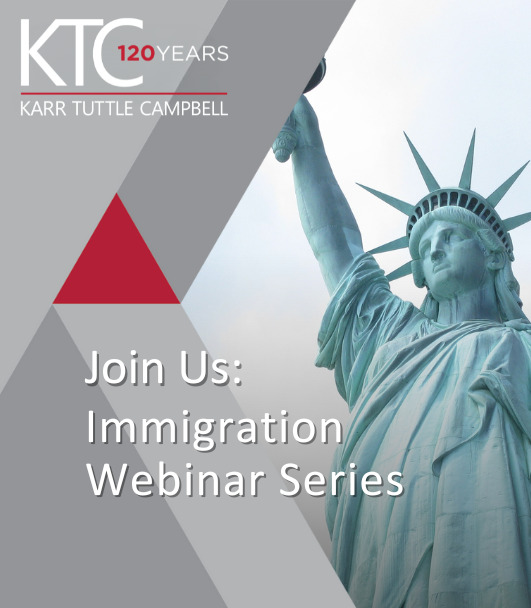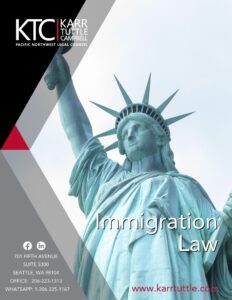Join us Thursday, February 22, 2024, from 12:00 – 1:00 pm PST, for a Zoom Webinar with KTC Presenter, Kripa…



As Seattle I-9 lawyers and immigration compliance attorneys, we have decades of experience helping businesses across throughout Washington state and throughout the Pacific Northwest understand and meet their I-9 compliance obligations concerning documenting employee eligibility to work in the U.S. In this capacity we help companies develop compliance programs, assist with audit and documentation matters, and respond to government inquiries regarding I-9 compliance.
I-9 is a government form used to verify the identity of workers and confirm their eligibility to work in the United States. The form itself prescribes the verification documents acceptable to confirm employment eligibility, and such verification documents must be presented to the employer at the time of hire. Employers must then make copies of the eligibility documents presented by each employee and verify employment through the United States Custom and Immigration Services (USCIS) online portal.
All U.S. employers – regardless of size – are subject to I-9 compliance. Similarly, all employees working in the U.S. must submit legitimate documents to confirm eligibility for work in the U.S.
If your company will be hiring employees, it will be helpful to retain the services of an I-9 lawyer who can assist with implementing a compliance program, including providing any assistance desired with creating a new company account in the USCIS I-9 portal. We are available to answer questions and to help companies implement a thorough documentation program and to set up periodic audits to ensure ongoing compliance.

There are substantial penalties that can be levied by I-9 noncompliance, which can range from hundreds of dollars to thousands (or even tens of thousands) of dollars. Fines (including possible punitive fines) can be assessed if a business has previously been cited for I-9 non-compliance and/or based on the scope and magnitude of the non-compliance. Criminal prosecution can also be undertaken if the government believes that a company is knowingly employing non-eligible (or illegal) workers.
In addition to fines and potential criminal exposure, sanctions are also possible, which may restrict company eligibility for certain matters, such as government contracts.
No Match letters are letters sent to employers by the government notifying of a mismatch between the name of an employee and the social security number of the employee.
Although not always the case, no-matches are often caused by employees who are not authorized to work in the United States (and are using either a false SSN or an SSN assigned to someone else). This issue is of considerable concern to employers because of increased immigration enforcement against companies who employ unauthorized foreign workers.
Our firm has counseled employers on employer sanction issues and has represented employers in such enforcement proceedings.
The U.S. Citizenship and Immigration Services (USCIS) FDNS unit regularly conducts UNANNOUNCED site inspections to the location of the employer where the employer(s) indicated a foreign national would be working. Most common in situations where employees are on F-1 OPT/H-1B or L-1A visa status, these site visits can be extremely stressful for the employee and HR.
Although participation is voluntary and employers have the right to decline to participate, most employers will subject themselves to a site inspection without the benefit of an attorney present.
During site visits by an FDNS officer, employers must field questions on a range of topics from general questions about the business, its number of employees and revenues; to questions about the business’ immigration policies and the number of nonimmigrant and immigrant petitions it files for employees. Company representatives, including its General Counsel and Human Resources Manager, may also be questioned about specific petitions and the sponsored foreign national’s background, credentials and experience, and be asked to provide documentation including organization charts, wage reports, W-2s and Forms I-9. In addition, the foreign national’s manager and foreign national may be questioned by the FDNS.
FDNS officers may wish to tour the company premises and foreign nationals’ work areas and document the site visit with photographs. The depth of investigations varies widely from employer to employer; some may be asked one or two questions, and others may be looked into more thoroughly.
From our offices in Seattle, Washington, and Portland, Oregon, we help companies throughout the Pacific Northwest with I-9 and immigration compliance. For more information about I-9 or immigration compliance or any other immigration-related matter, contact Karr Tuttle Campbell at (206) 223-1313 to schedule a consultation with an experienced I-9 attorney.
In addition to I-9 and immigration compliance, we also assist employers in obtaining work visas for critical employees under the diverse range of business visas, as well as individuals and investors seeking to lawful U.S. immigration. Our range of business and non-business immigration includes the following:
|
|
I-9 refers to the legal requirement that U.S. employers must meet regarding the verification of an employee’s identity and authorization to work in the country. This obligation is enforced by U.S. Immigration and Customs Enforcement (ICE) and is mandated by the Immigration Reform and Control Act (IRCA) of 1986.
The term “I-9” refers to the Employment Eligibility Verification form, known as “Form I-9”, which must be completed by both the employer and the employee. The employer must examine the employment eligibility and identity document(s) the employee presents to determine whether the document(s) reasonably appear to be genuine and relate to the individual.
Employers are required to maintain completed I-9 forms for all current and former employees for a period. Employers can face penalties for failing to complete, retain, or make I-9 forms available for inspection by authorized government officers.
As part of the process of I-9 compliance, employers must create an account with USCIS and submit I-9 information when a new employee is hired.
Employers must electronically file I-9 information with USCIS through their company portal account withing 3 business days after a person is hired.
Failure to comply with the I-9 verification and record-keeping requirements can result in significant penalties for employers, including:
Beyond the financial and legal consequences, non-compliance can also cause reputational damage, operational disruption due to worksite audits, and potential exclusion from federal contracts. Therefore, it’s crucial for all employers to ensure they are in full compliance with I-9 requirements.
[1] 88 FR 2175. These fines are as of January 13, 2023, and may be subject to change in subsequent years.
As per Federal Regulations, I-9 forms for each employee must be retained for three years from the date of hire or up to one year after employment termination, whichever is later.
The Form I-9 Acceptable Documents can be found here. As noted on this page, employees can present a document that establish both Identity and Employment Authorization from List A, or documents that establish Identify from List B and documents that establish Employment Authorization from List C.
As an example, List A documents include in part:
No. Even if you are an entity that has opted into the E-Verify program, you MUST still complete an individual Form I-9 for each individual hired for employment, irrespective or their US Immigration Status.